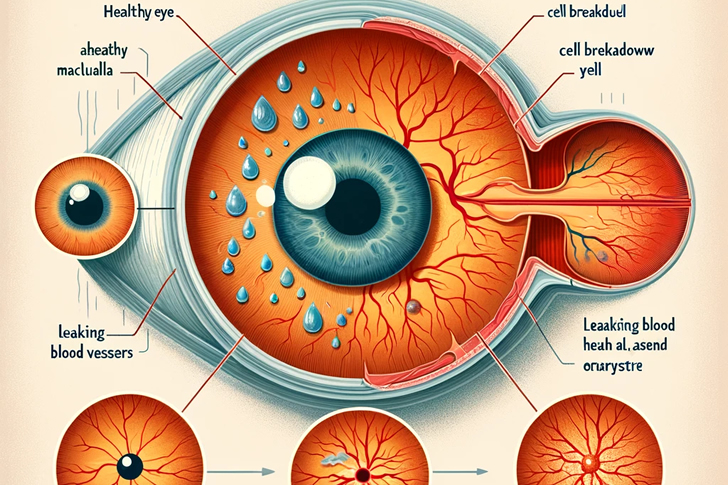Understanding Macular Degeneration: Leading Cause of Vision Loss
Macular degeneration is a widespread eye condition that impacts millions globally, particularly those over the age of 50. This progressive eye disease significantly affects vision, making it crucial to comprehend its causes, risk factors, and treatment options. We’ve carried out detailed research, you’ll find comprehensive insights into understanding macular degeneration.

Early Signs and Symptoms
- Distorted Vision: Straight lines appear wavy or bent.
- Blurred Vision: Difficulty in seeing details, both up close and at a distance.
- Dark, Blurry Areas or Whiteout: Appearing in the center of one’s vision.
- Color Perception Changes: Colors appear less vibrant; difficulty distinguishing between different shades.
- Increased Need for Brighter Light: When doing close-up tasks, there may be an increased need for more light than before.
Risk Factors
- Age: Primarily affects people aged 50 and older.
- Genetics: Family history of AMD increases risk.
- Smoking: Significantly doubles the risk of AMD.
- Race: More common among Caucasians than other races.
- Diet: High-fat diet, lack of fruits and vegetables can increase risk.
Diagnosis and Treatment
Diagnosis involves clinical exams including:
- Amsler Grid Test: Detects vision abnormalities.
- Dilated Eye Exam: Provides a closer look at the retina.
- Optical Coherence Tomography (OCT): Visualizes the retina’s structure in detail.
Treatment varies based on the type of AMD:
- Dry AMD Treatment:
- Nutritional Supplements: Antioxidants and zinc may help slow disease progression.
- Lifestyle Changes: Quitting smoking and adjusting diet.
- Wet AMD Treatment:
- Anti-VEGF Therapy: Injections that reduce new blood vessel growth.
- Laser Therapy: Destroys actively leaking blood vessels under the retina.
Natural Solution For Macular Degeneration
- Dietary Adjustments:
- Antioxidant-Rich Foods: Consuming foods high in antioxidants can help reduce oxidative stress, which is believed to contribute to AMD. Foods rich in antioxidants include dark leafy greens like spinach and kale, brightly colored fruits like blueberries and oranges, and nuts.
- Omega-3 Fatty Acids: Omega-3 fatty acids, found in fish like salmon and mackerel, are known for their anti-inflammatory properties and may help maintain retinal health.
- Supplements:
- AREDS2 Formula: The Age-Related Eye Disease Study 2 (AREDS2) suggests a formula that includes vitamins C and E, zinc, copper, lutein, and zeaxanthin, which may help reduce the risk of progression in people with intermediate to advanced AMD.
- Zinc: Zinc is an essential trace mineral important for maintaining eye health. It can be found in high amounts in meat, shellfish, dairy, and whole grains.
- Lifestyle Changes:
- Quit Smoking: Smoking significantly increases the risk of developing AMD and can accelerate its progression.
- Exercise: Regular physical activity can help improve overall health and reduce the risk of chronic diseases that might worsen AMD.
- UV Protection: Protecting eyes from UV rays with sunglasses can help reduce retinal damage.
- Regular Eye Exams:
- Monitoring Vision Changes: Regular check-ups with an eye care professional can help catch early signs of macular degeneration and start appropriate interventions.
- Visual Aids:
- Magnifying Devices: Using aids like magnifying glasses can help individuals with AMD maintain their quality of life by making it easier to read and perform other tasks that require sharp vision.
Frequently Asked Questions (FAQ)
- What is macular degeneration?
- It’s a condition that affects the retina, leading to vision loss.
- Can macular degeneration be cured?
- There’s no cure, but treatment can slow progression or reduce severity of symptoms.
- How often should I test my vision if I’m at risk for AMD?
- Regular eye exams are recommended yearly, or as directed by your eye care professional.
- Are there lifestyle changes that can reduce the risk of AMD?
- Yes, maintaining a healthy diet, quitting smoking, and protecting eyes from UV rays can help.
References
- American Macular Degeneration Foundation: www.macular.org
- National Eye Institute: www.nei.nih.gov
- American Academy of Ophthalmology: www.aao.org
- Macular Society: www.macularsociety.org
Share this article 











Recent Comments